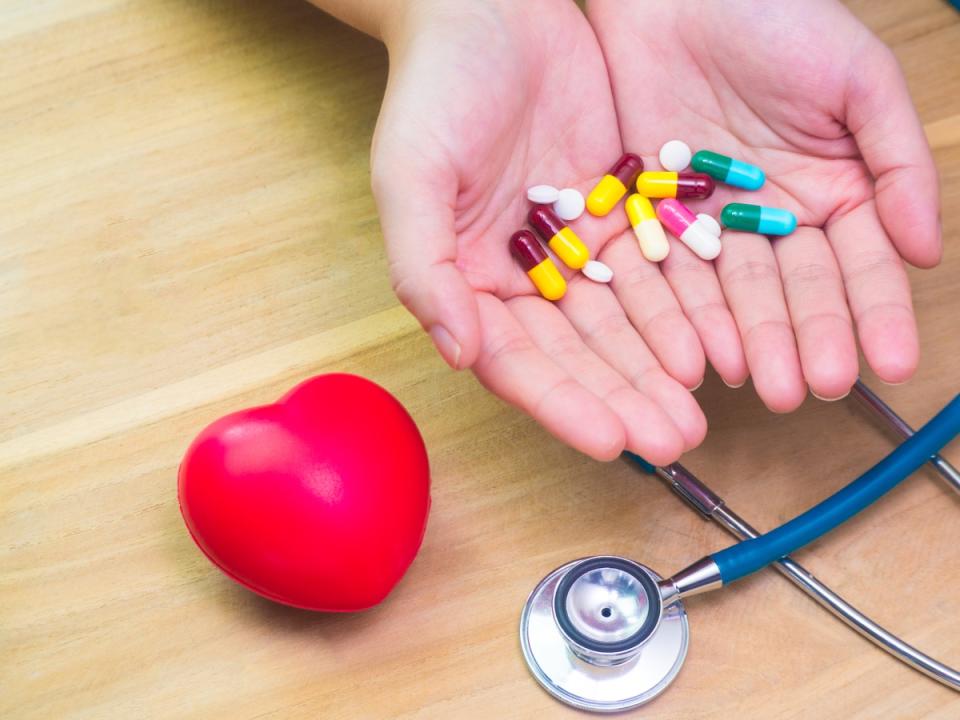Many of us need to take prescription medication for one reason or another. In fact, 131 million U.S. adults (roughly 66 percent of the population) take at least one prescription drug daily. Most of these drugs treat five common chronic conditions—heart disease, high blood pressure, diabetes, arthritis, and cancer. And while medications for these conditions often have unwanted side effects, their benefits tend to outweigh their drawbacks.
However, if you’re a man and take medication for one common health condition, you could be increasing your odds of erectile dysfunction (ED). Read on to find out which medication can cause ED, so you can avoid potentially awkward (and embarrassing) encounters in the bedroom.
READ THIS NEXT: Breathing This Way Could Be Hurting Your Sex Life, Doctors Say.
Sexual dysfunction can show up in several ways.
It’s no secret that medications come with baggage in the form of side effects, many of which impact your sexual health. Common symptoms of sexual dysfunction caused by prescription and OTC medications include low libido, impotence, lack of arousal, failure to reach orgasm, and pain during sex. And the more medications you take, the more your risk of sexual dysfunction increases.
Sexual dysfunction is defined as “persistent, recurrent problems with sexual response, desire, orgasm or pain — that distress you or strain your relationship with your partner,” reports the Mayo Clinic. Common prescription medications that affect sexual health include antidepressants, anti-anxiety medications, opioid pain relievers, steroids, and beta-blockers.
READ THIS NEXT: If You’re Taking This Common Medication, Call Your Doctor Now, FDA Warns.
Taking this medication can lead to ED.

If you’re a man with high blood pressure and you struggle with ED, the medication you take to treat your hypertension could be the culprit behind your impotence. An estimated 25 percent of all ED cases are caused by blood pressure medications, according to the Harvard Medical School. However, while several types of blood pressure medications exist, not all of them affect sexual function.
“The blood pressure medication most commonly involved in ED is a class of medication called beta-blockers,” says Laura Purdy, MD, MBA, a board-certified family physician in Fort Benning, Georgia. “These medications can slow down the heart rate and prevent the body from achieving and maintaining erections.”
The good news is that if you’re experiencing ED due to beta-blockers, you can ask your doctor about other blood pressure meds that don’t impair your ability to perform in bed. “If a patient does have ED, it’s perfectly acceptable to offer them other types of blood pressure medication,” says Purdy.
Beta-blockers reduce blood flow.

It’s estimated that half of U.S. adults have high blood pressure, and nearly 92 million take some form of blood pressure medication. Beta-blockers are one of the most widely prescribed drugs among these blood pressure medications in America. According to a 2021 study published in Frontiers in Cardiovascular Medicine, beta-blockers are associated with reduced blood flow, fatigue, low libido, and sexual dysfunction. Another study published in Vascular Health and Risk Management in 2020 noted that among 1,007 adult males who took beta-blockers for at least six months, 71 percent reported having ED.
If you’re looking for ways to address your ED on your own, Purdy advises, “Make sure that all of your medical problems are under control. For example, diabetes, sleep apnea, high blood pressure, and other medical conditions should be addressed and optimized regarding their management. Other medications, such as sildenafil and Viagra, can treat ED, even in men with high blood pressure.”
For more health news sent directly to your inbox, sign up for our daily newsletter.
Know when to see a doctor for your ED.

If ED has become an intrusive, nagging problem in your life or negatively affects your relationship with your partner, consider visiting your healthcare provider. “Intermittent, situational, or occasional ED can be considered normal and a common experience for men. But when it’s repeatedly occurring with every instance, or if there’s pain or other changes to the penis, it’s advisable to seek medical attention right away,” Purdy says.
Like most other medical conditions, adopting healthy lifestyle habits can reduce your chances of developing ED. Common modifiable risk factors for ED include smoking, excessive alcohol consumption, cardiovascular disease, diabetes, and depression. Eating a healthy, well-balanced diet combined with regular exercise is a recipe for addressing high blood pressure and sexual dysfunction and adding years to your life.
Best Life offers the most up-to-date information from top experts, new research, and health agencies, but our content is not meant to be a substitute for professional guidance. Always consult your healthcare provider directly when it comes to the medication you’re taking or any other health questions you have.